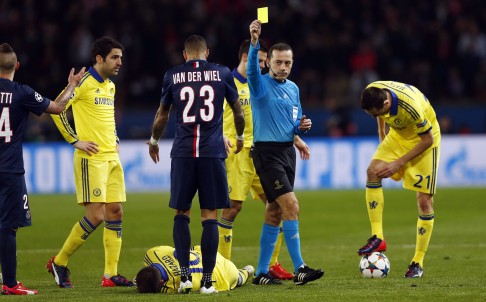In search of the 'spirit' of the game of soccer
Authorities
often talk of the 'spirit' soccer should be played in, but refuse to
define it, leaving the game vulnerable to cheats
Hong Kong Football Association chief executive Mark Sutcliffe. Photo: Felix Wong
Exactly what is the "spirit" that is expected of players and coaches in the beautiful game? How do players and coaches understand and apply the "spirit of the game"? And, more importantly, how should referees interpret this?
These are important questions for Hong Kong because for the coming soccer season and beyond, the Hong Kong Football Association has asked players, team officials and match officials to sign a "rules of conduct" document, which previously was available only in Chinese.
According to HKFA chief executive Mark Sutcliffe, the document has been translated for the first time into English as part of the association's commitment to become more bilingual. The document is important and will further develop into one based on Fifa's "code of conduct" to help fight match manipulation. Any player, coach or referee who refuses to sign the document will be barred from HKFA activities.
The first sentence of the English version states: "Players and team/match officials shall at all time [sic] play football in the spirit of the game."
Strangely, there is no official definition of "spirit of the game" available from Fifa or other bodies. It is simply assumed that soccer lovers intrinsically know what this spirit is. Therefore, the statement could mean all manner of things to all manner of people in all manner of situations.
The humour website Urban Dictionary states: "The spirit of the game is defined by the intended rules as perceived in reflection to the other rules. This most comes into [play] when the action in question is not governed by a set rule. In this case, you are bound to play by the spirit of the game."
It uses the board game Monopoly as an example.
"If after a considerable number of turns have been taken by each player, and one player gets into trouble and debt, instead of losing and congratulating the winner, he proposes to 'join forces' with another player - sharing money, property, and victory. Though this joining has no rules set against it, this is against the spirit of the game, though not implicitly stated. To join forces to tip the game in your favour is against the spirit of the game."
In this sense, the idea of not being able to accept defeat graciously, and instead attempting to manipulate the game in one's favour, is considered to be against the spirit of the game. This sounds very much like being a bad loser and trying to win at all costs.
How often do we see players, coaches and supporters behave like this? And how frequently do we see teams attempt to manipulate the game in their favour or to blame match officials for the result?
One example where an action is not governed by a set rule, but is bound by the spirit of the game, is when players deliberately stop the game so an injured player may receive treatment. When play resumes, players and supporters clap in appreciation of this gesture. From Rational Ref's perspective, the clapping is usually insincere, mechanical and superficial.
Consider further when a goalkeeper has the ball in his hands and an opposition player is down injured. The goalkeeper will throw the ball out so the injured player can receive treatment. Usually, the player is not seriously injured, probably the reason the referee did not stop the game in the first place.
Players who put the ball out of play take the risk of being duped. Nevertheless, after the injured player has been dealt with, his teammates will usually return the ball. Now depending on different people's interpretation of "spirit of the game", the way the ball is returned can take on different forms. Since the goalkeeper previously had the ball in his hands, it would be fair to return the ball directly to him; but this rarely happens. It is more common for the team to put the ball out over the goal line to force a goal kick.
Do players perceive a goal kick, rather than the goalkeeper kicking the ball out from his hands, to be more or less favourable? Occasionally, a team will return the ball over the touch-line and close to the corner flag for a throw-in. Are these actions - which are clearly not reciprocal - in keeping with the spirit of the game?
Moreover, is the fact that a player who pretends to be injured and therefore dupes his opponents into wasting time considered to be acting against the spirit of the game? Or is it in keeping with the spirit because it is better to be safe than sorry after receiving a knock? Without a proper definition from the authorities, these situations are both justified and vilified.
During tough competitive matches we rarely see the spirit of the game because teams go out to win, and not to make friends. Even the handful of pre-season matches being played this week in Hong Kong by the four visiting English Premier League teams (Manchester City, Tottenham Hotspur, Sunderland and Manchester United) and HKFA Division One teams (South China and Kitchee) will be far from "friendly".
Considering there is no official definition of the spirit of the game, it is extraordinary how match officials throughout the decades have done their level best to ensure that matches are played fairly, safely and in an enjoyable manner that is in keeping with the "spirit of the game" … whatever that is supposed to be.
It is simply a fuzzy, hazy and unclear concept that is used to instil a sense of sporting behaviour and respect in the game.
Agree or disagree? Contact Rational Ref at rationalref@gmail.com
This article appeared in the South China Morning Post print edition as In search of the 'spirit' of the game
PUBLISHED : Friday, 26 July, 2013












